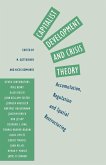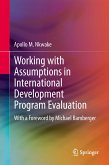Peter Leonard provides an accessible analysis of debates about the crisis of the welfare state under the contemporary conditions of postmodern scepticism and the triumphs of global market capitalism. In the last two decades Western governments have sought to replace the post-war welfare compact with neo-conservative individualism. The prospects for the Left look bleak. At the same time, postmodern critique raises profound questions about the validity of a mass politics of emancipation based on the universal values of justice, reason and progress.
From a critical perspective founded in Marxism and feminism, Leonard uses elements of postmodern deconstruction to consider how we might now re-think the present and future of welfare. He draws the reader into a dialogue about the implications for reconstructing welfare: of changes in ideas about the individual subject; the context of culture and racism; the organization of welfare; the nature of 'the new economy'; and the possibilities of a politics of resistance.
From a critical perspective founded in Marxism and feminism, Leonard uses elements of postmodern deconstruction to consider how we might now re-think the present and future of welfare. He draws the reader into a dialogue about the implications for reconstructing welfare: of changes in ideas about the individual subject; the context of culture and racism; the organization of welfare; the nature of 'the new economy'; and the possibilities of a politics of resistance.
Dieser Download kann aus rechtlichen Gründen nur mit Rechnungsadresse in A, D ausgeliefert werden.
`Postmodern Welfare is a richly textured and multi-layered book which is going to make a significant contribution to the history of ideas' - International Social Work `This is an original and challenging book about the prospects for welfare in the context of a postmodern global economy. In a searching analysis, Peter Leonard raises key questions about the ways in which the Left might respond to this context through a reflexive politics of resistance. In so doing, he charts a careful course towards reconstructing an emancipatory project for welfare, a course which rejects both the sceptical pessimism of much postmodernist thought and the utopian optimism which characterised much traditional Left politics. The book deserves to be read widely and to be actively debated by all those committed to the development of human welfare in progressive directions' - John Harris, University of Warwick `Postmodern Welfare will be indispensable in re-situating the stalled politics of the welfare state' - Geoffrey Pearson, Goldsmith College, University of London 'Peter Leonard's book is a major achievement, providing a long overdue assessment of the debate on modernity and welfare. The study combines social theory with a keen sense of history, producing a unique and innovative text relevant to a wide range of disciplines' - Chris Phillipson, Social Policy Association affil to check in pick `Leonard's book is useful for its discussion on the implications of postmodernism for human well-being....his attempt to harness the potential of popular social movements to engage in effective activism is an interesting one. It is one of the few coherent explications not only of how postmodernism can provide a normative basis for social welfare but how activism can be kept alive in a world which is increasing indifferent to human suffering, social causes and collective action. It remains to be seen whether his ideas and prognostications will be translated into a viable emancipatory project' - Journal of Sociology and Social Welfare









